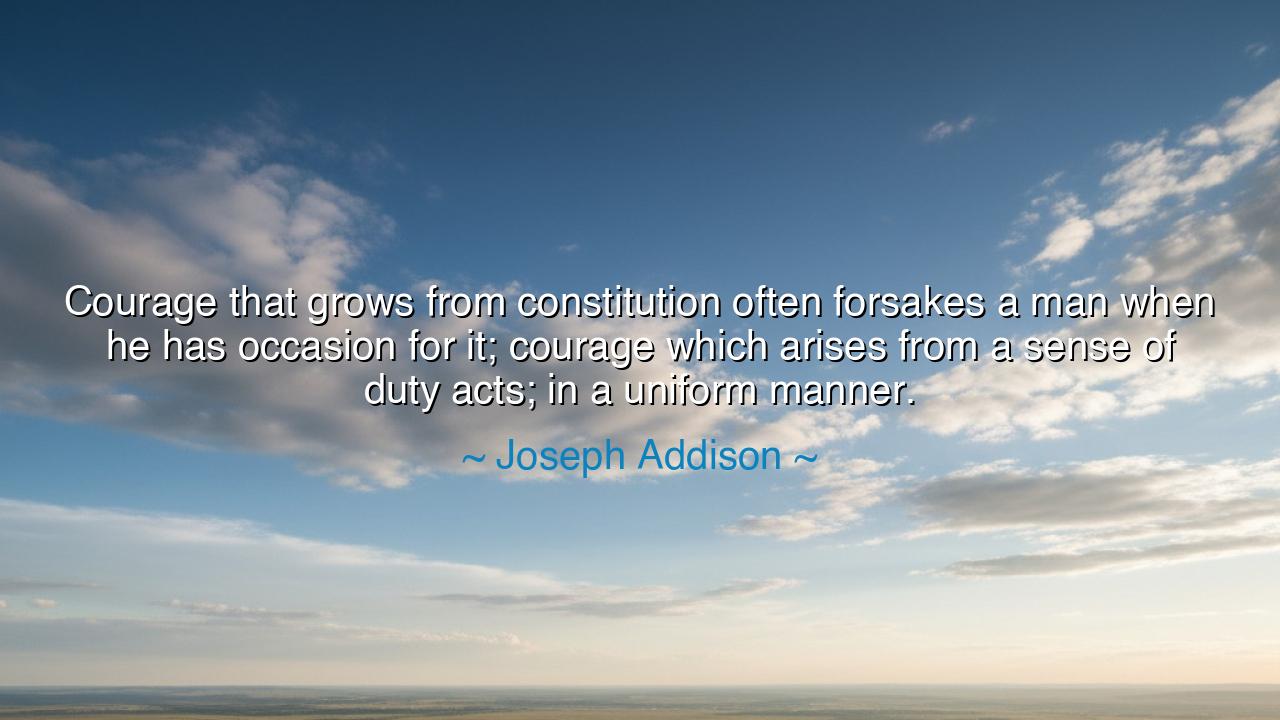
Courage that grows from constitution often forsakes a man when he
Courage that grows from constitution often forsakes a man when he has occasion for it; courage which arises from a sense of duty acts; in a uniform manner.






When Joseph Addison wrote, “Courage that grows from constitution often forsakes a man when he has occasion for it; courage which arises from a sense of duty acts in a uniform manner,” he spoke as a philosopher of the human heart and a student of virtue. These words, drawn from the deep well of moral reflection, distinguish between two kinds of courage—one born of mere temperament, and another born of duty. The first is like the wind: strong one moment, gone the next. The second is like the mountain: steadfast, unmoved by storm or sun. Addison’s wisdom reminds us that true bravery does not depend on mood or circumstance, but on the moral conviction that a man must do what is right, even when fear presses close.
Addison, an English essayist and statesman of the early eighteenth century, lived in an age of reason and virtue. Through his writings in The Spectator, he sought to elevate the moral character of his readers, teaching them that integrity was the highest ornament of the soul. His reflection on courage was no idle thought—it was born of observing how easily human strength falters when not anchored in principle. The courage of constitution, he wrote, is a natural boldness—a gift of temperament or physical vigor. But when trials come that test the spirit rather than the body, such courage often fails. Only the courage of duty, the resolve born from moral law, endures through fear, pain, and uncertainty.
To understand this difference, consider the soldier whose bravery lies only in his fiery blood. In the thrill of battle, with drums beating and comrades beside him, he stands fearless. But when silence falls, and duty calls for restraint, mercy, or sacrifice—his courage fades. Yet another soldier, quieter in nature, may tremble at first. But because his heart is fixed upon his duty—to protect, to obey, to serve—he acts with calm resolve, even when the body quakes. This second kind of courage, Addison teaches, is the truer kind, for it does not rely on passion or circumstance, but upon principle.
History is rich with examples of such steadfast duty-bound courage. Think of Sir Thomas More, who stood before the wrath of King Henry VIII and refused to betray his conscience. He was no warrior, no man of strong constitution. He was gentle, thoughtful, even hesitant in speech. Yet when duty called him to stand for truth, his courage was unwavering. “I die the king’s good servant,” he said, “but God’s first.” His strength did not come from body or temperament, but from the conviction that right must be done, regardless of cost. His duty gave him the power that constitution could not.
The ancients, too, understood this wisdom. Aristotle taught that virtue is a habit of the soul—that moral courage is not a burst of emotion but a constant readiness to act according to reason. The Stoics, like Marcus Aurelius, spoke of the courage that comes from duty to one’s role in the cosmic order. For them, the brave man was not the one who felt no fear, but the one who did his task faithfully despite it. “If it is not right,” wrote Aurelius, “do not do it; if it is not true, do not say it.” Such words echo Addison’s thought: duty gives courage its uniformity, its constancy, its divine steadiness amid the tempests of human frailty.
And so we learn that the courage of temperament is like fire—bright but fleeting. The courage of duty is like iron—strong, enduring, tested by flame. The first may carry a man through one great moment of action; the second carries him through a lifetime of righteousness. To build the second kind, one must cultivate not the body, but the soul. One must train the conscience as a soldier trains his sword—so that when the hour of trial comes, the will acts not from impulse, but from purpose.
So, my children of thought and conscience, take this teaching to heart: seek not the courage of the moment, but the courage of conviction. Do not rely upon fleeting feelings of strength, for they will betray you when the darkness grows deep. Instead, anchor yourself in duty—to truth, to justice, to love, to God. When courage arises from these eternal roots, it will not falter; it will “act in a uniform manner,” as Addison said, steady through every trial. The storms of fear may rage about you, but your spirit will remain calm, your path straight. For the man or woman whose courage springs from duty walks not alone—their strength is joined with the eternal laws of heaven and the enduring peace of a righteous heart.






AAdministratorAdministrator
Welcome, honored guests. Please leave a comment, we will respond soon